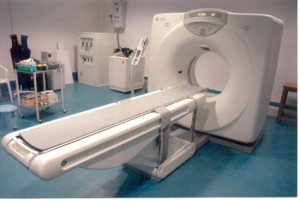by Your ER Doc on August 16, 2011

Don’t you just love watching figure skaters? So graceful, so smooth on the ice. The rest of us? Not so much. Nothing can go so wrong so fast as when we’re walking on icy sidewalks, or across frozen parking lots. Ouch!
So how do we stay safe in icy conditions?
Experts say good shoes are the first key. You want rubber or neoprene composite souls, preferably with good ankle support.
Walk very slowly, testing each step before putting all your weight down.
Keep your hands out of your pockets! Better to balance yourself with them, and use them to brace yourself if you do slip.
Don’t – repeat – don’t carry small children. If you fall, they’ll be helpless.
Hang on to your vehicle when getting in or out of it.
Don’t take shortcuts. Plan your route and give yourself time.
Oh, and it helps to have a sense of humor.
by Your ER Doc on August 1, 2011
 ? When a patient needs imaging to diagnose medical problems and plan treatment, doctors agree that the benefits of radiation exposure outweigh its dangers. The risk of radiation is not zero, but let’s put it in perspective. We’re constantly exposed to background radiation. The American College of Radiology has determined that the radiation exposure in a chest x-ray is about the same as ten days of natural background exposure. A mammogram equals about seven weeks.
? When a patient needs imaging to diagnose medical problems and plan treatment, doctors agree that the benefits of radiation exposure outweigh its dangers. The risk of radiation is not zero, but let’s put it in perspective. We’re constantly exposed to background radiation. The American College of Radiology has determined that the radiation exposure in a chest x-ray is about the same as ten days of natural background exposure. A mammogram equals about seven weeks.
The risk of plain xray imaging is therefore considered low to very low, but the relative exposure is much higher for CT scans. CT of the abdomen produces the equivalent of about five years of background exposure. Whether this risk is warranted depends on the situation.
Remember, radiation exposure adds up. It’s a good idea to keep your own x-ray history and share it with your doctor.
by Your ER Doc on July 20, 2011
 How should you prepare if you need surgery? Your surgeon will give you specific instructions. But here are some general guidelines.
How should you prepare if you need surgery? Your surgeon will give you specific instructions. But here are some general guidelines.
A healthy body heals faster. So if possible, get your body into shape. Exercise and stretching programs are key. Eat less junk food, and more protein and fiber.
Several weeks before surgery, stop taking anti inflammatory drugs that could cause unnecessary bleeding, unless your surgeon wants you to. If you take herbs, check with your doctor. Some can complicate anesthesia and should be stopped. Stop or reduce smoking and alcohol consumption.
It’s important that you go into surgery in a positive frame of mind. If you are so inclined, several books are available dealing with mind-body preparation for surgery. There are relaxation techniques that can help reduce anxiety and improve the recovery process.
Talk with your family and your doctor. Stay positive.
by Your ER Doc on July 6, 2011
 Are you embarrassed to ask your doctor questions? Please don’t be. It’s your body. You have a right to know what’s going on – especially if you’re having surgery.
Are you embarrassed to ask your doctor questions? Please don’t be. It’s your body. You have a right to know what’s going on – especially if you’re having surgery.
There are some basic questions you should ask.
First, get a simplified explanation of the surgery, and why it’s needed. What outcome can you expect? Does it need to be done right away? What happens if it’s not done? Are there non-surgical options to consider?
Ask your doctor what the risks are. What kind of anesthesia will be used. What’s the recovery process? Are there preparations to be made?
Don’t hesitate to ask your surgeon how many times he or she has done this procedure. What’s the success rate? Can you get a second opinion?
And of course the big question – is it covered by your insurance?
Remember, it’s good medicine to be involved in your own care.
by Your ER Doc on June 25, 2011
 When do you stop researching the internet, and actually call your doctor? Well, let your common sense guide you. If you’re in doubt – make the call. But we can find help on the internet.
When do you stop researching the internet, and actually call your doctor? Well, let your common sense guide you. If you’re in doubt – make the call. But we can find help on the internet.
For example, The Mayo Clinic has a useful website. Let’s say you have a fever. Go to their web site and click on the “medical information” link. You’ll get an list of alphabetized medical conditions. Click on fever and you’ll go to a page that defines fever. Then click on “symptoms,” and you’ll go to a page that lists them, and tells you when you should see a doctor.
Any sudden, severe, or persistent pain should prompt you to seek care. New symptoms, or ones that get worse or won’t go away also warrant a call to your doctor. Tell your doctor if your body is not responding to medication.












